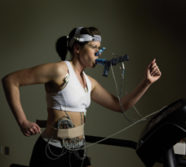What Information Can Be Obtained?
As mentioned, gas exchange is a critical measurement that is obtained with cardiopulmonary stress testing. There are also immediate vital measures that are provided, including blood pressure, heart and respiratory rates. Heart and lung function levels are reported, including coronary blood flow. What does that mean for you? This information can assist our concierge physicians in ascertaining your heart valve function, which will assist in evaluating the potential for heart failure. This information also helps us in developing your exercise plan, predict any other possible health risks, and strategically planning for a variety of potential preventive measures/procedures including pacemaker adjustments and pulmonary or cardiac rehabilitation programs.
How Is Cardiopulmonary Testing Performed?
The non-invasive test is performed in My Concierge MD’s private Beverly Hills office. The patient is connected to a cardiac monitor, blood pressure cuff and finger clip. A mouthpiece is connected with headgear to keep it from slipping out and a soft nose clip is attached so that the patient breathes exclusively from the mouth. The concierge physician will then start the treadmill and slowly increase the speed and grade, monitoring the levels as explained above. The test will be stopped once the patient can no longer exercise and/or when the doctor has gleaned enough information. The patient is constantly monitored, so if there appears to be any ill effect, the doctor will also stop the testing.
How Long Will The Test Take?
The test should take about 1 ½ hours to complete. The test results can be reviewed with you shortly thereafter with your concierge physician at My Concierge MD. To learn more about cardiopulmonary testing or to schedule YOUR test date (under concierge physician’s recommendation), please fill in the form under Contact or call 877-760-3570.



